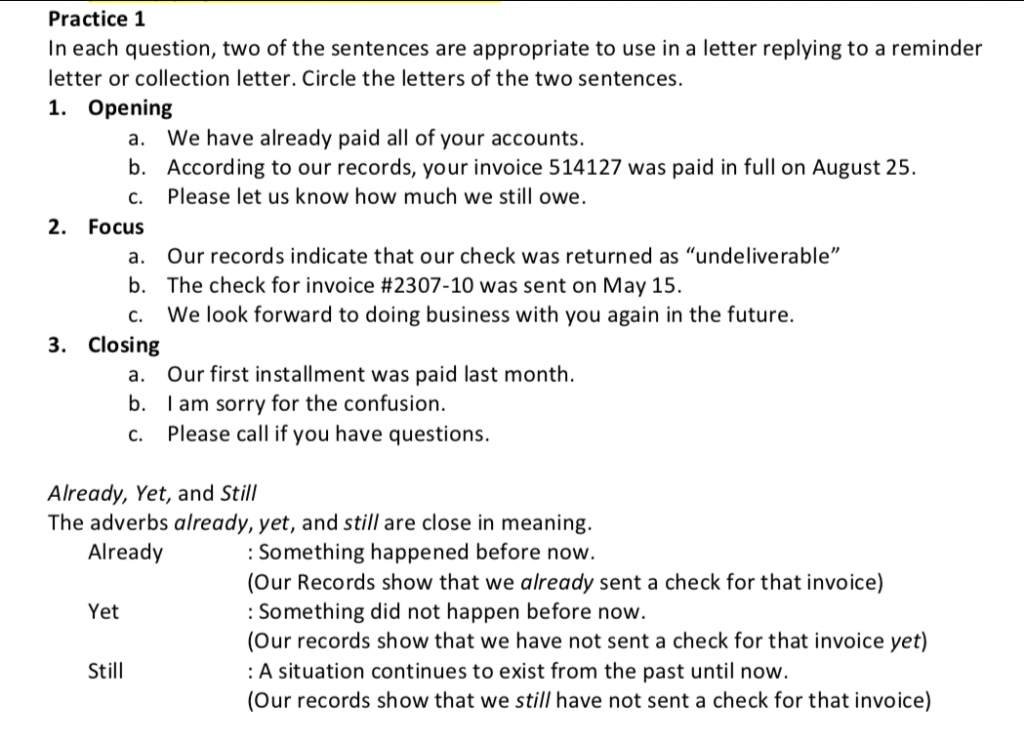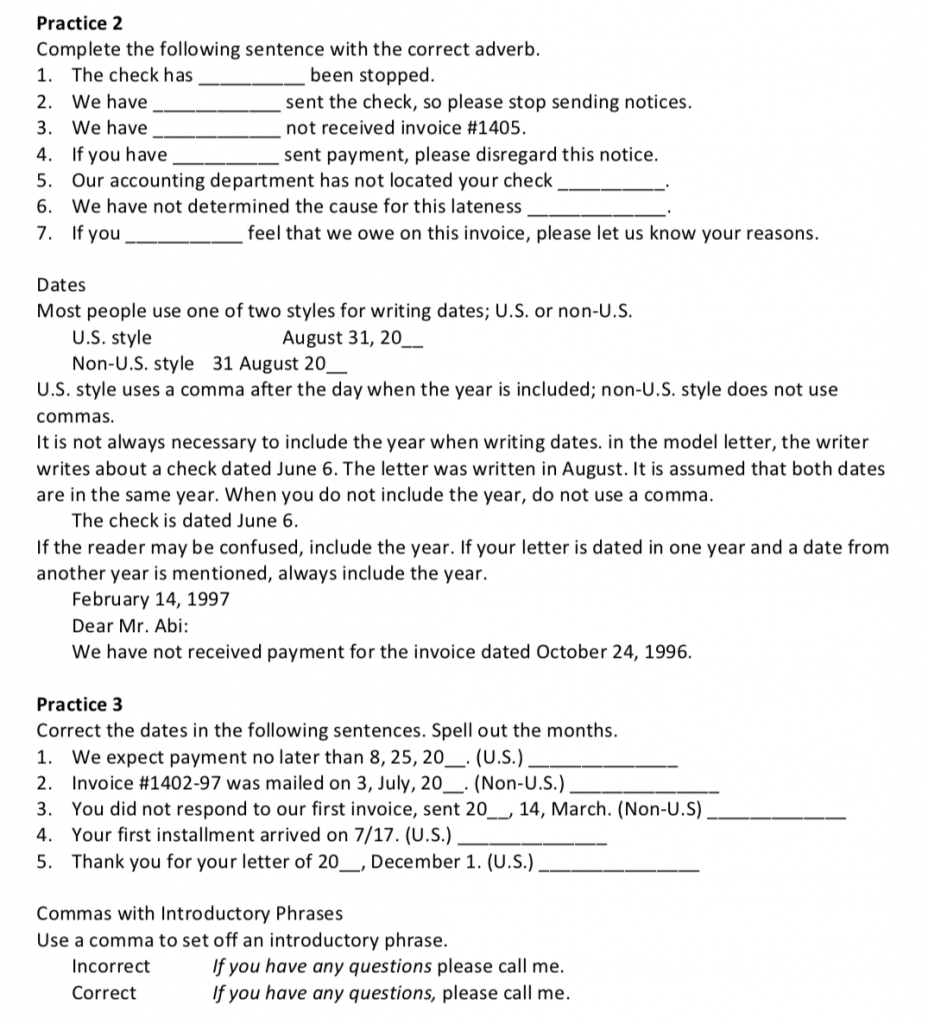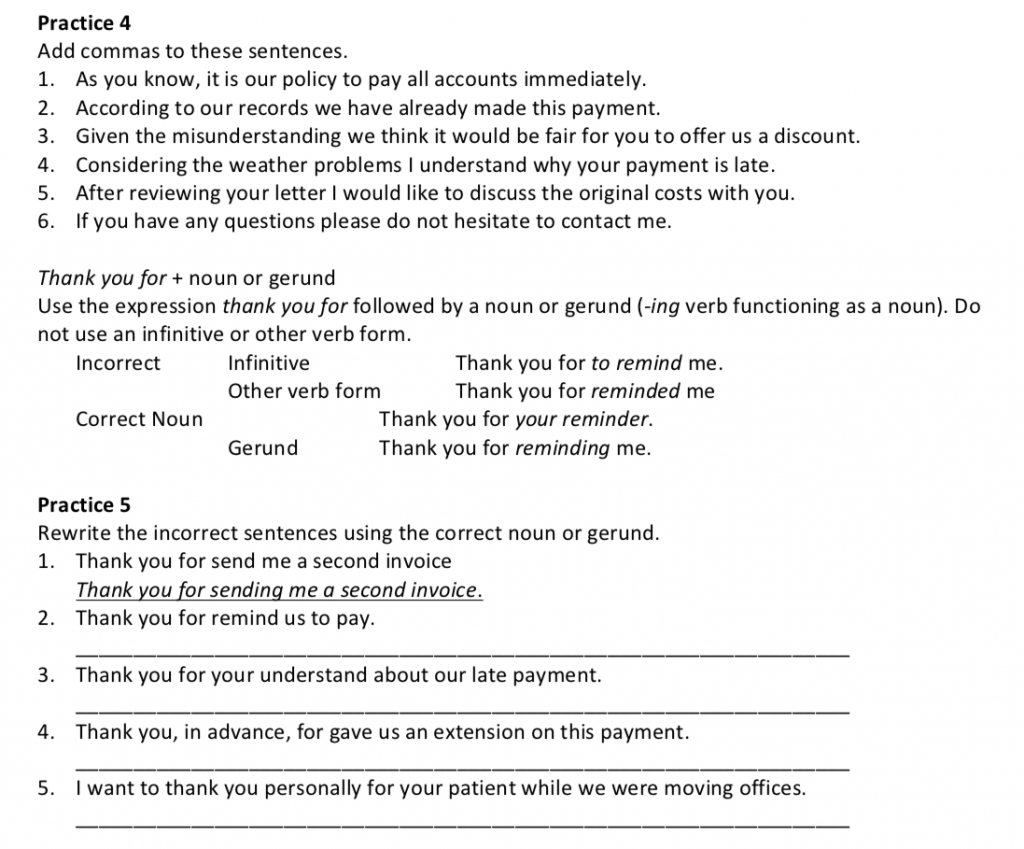- Writing a cover letter/application letter.
Practice 1
Circle the letter of the sentence that is most similar to the sentence in the Model Cover Letter above.
1. Opening
a. I am applying for the position of administrative assistant.
b. I need a job.
c. I saw your advertisement for an administrative assistant in the March 14, 2021 The Jakarta Post.
2. Focus
a. My work experience matches your requirements. I worked as an administrative assistant for two years.
b. I’m a quick learner. I’ve never worked before.
c. I have the skills required. I am familiar with word processing programs.
3. Action
a. I will contact you early next week.
b. I will call you on Tuesday morning to discuss the position.
c. I’ll be at home if you need me.
4. Closing
a. Looks good, right?
b. I look forward to working with NetLives.
c. I look forward to talking to you next week.
Salutation
- Write to a spefic person. Before you write, try to find out the name (and gender) of the person you are writing to. You can call the company or check their Web site.
Dear Ms. Salma:
Dear Mr. Puspasari:
- If you don’t know the gender, use the person’s full name or initial.
Dear Andre Ayesha:
Dear K. Wijaya:
- If you don’t know the name, use the person’s title.
Dear Human Resource Specialist:
Dear Recruiter:
- If you know only the address, use a generic salutation.
Good morning:
Practice 2
Write the salutation for a cover letter for the following jobs. Don’t forget the colon.
| Position | Source | Contact |
| 1. Customer Service Representative | May 13 The Jakarta Post | M. Hadi |
| 2. Administrative Assistant | A-way.com Web site | recruiter@a-way.com |
| 3. Receptionist | IronGate.com Web site | Jamal Santosa |
| 4. Executive Assistant | Word-of-mouth | Michael Hartanto |
1. ____________________________
2. ____________________________
3. ____________________________
4. ____________________________
Opening
In the opening of a cover letter, tell the reader two things:
(1) what job you are applying for and
(2) the source of your information.
Practice 3
Complete these opening sentences for cover letters for the jobs in Practice 2. Use the prepositions about, for, in, and on. Some prepositions will be used more than one time.
1. I saw your advertisement __________________ a customer service representative __________________ the May 13 The Jakarta Post.
2. I am applying __________________ the position of administrative assistant announced _________________ the A-Way.com Web site.
3.___________________ the IronGate.com Web site, I read __________________ an opening ___________________ a receptionist.
4. Your colleague, Michael Hartanto, told me _____________________ the executive assistant opening.
Focus
The body of a cover letter focuses on your skills. Briefly describe why you are suited for the job. Tell the reader how your skills match the job requirements.
Practice 4
- Read the two job advertisements. Pay attention to the qualifications needed.
- Complete the Job Requirements Charts. Write a check (V) if the job advertisement asks for the requirement.
- Write a check if your skills match the requirement.
| NetLives | Administrative Assistant |
|---|---|
| The ADMINISTRATIVE ASSISTANT will work with the general manager. The individual will manage schedules, order supplies, prepare expense reports, and perform general word processing. The admin. asst. will be responsible for mailings, faxes, photocopying, and filing. A high school degree and a minimum of 2 years of experience are required. NetLives offers a fun, dynamic, and innovative work environment. Contact Information Maria Helena Human Resource Specialist mhelena@netlives.com NetLives Ltd. The Plaza Office Tower, Jl. MH Thamrin, Jakarta Pusat. Tel: (021) 334566 Fax: (021) 534987 | A local Internet service provider has a full-time position available for an administrative assistant. This individual will perform general administrative duties. Candidates must be familiar with word processing programs. Successful candidates must also have excellent communication skills. A college degree is a must. Salary: Rp. 120.000.000,- to Rp. 200.000.000,- per year. E-mail resume to resumespptsrvc@acaison.net. |
JOB REQUIREMENTS CHART
| Website Ad | Newspaper Ad | Requirement | Your Skills |
| (1) | Will perform general administrative duties such as photocopying and filing | ||
| (2) | Will have a college degree | ||
| (3) | Must be familiar with word processing programs. | ||
| (4) | Will have at least 2 years of experience as an administrative assistant. | ||
| (5) | Must have excellent communication skills. |
Practice 5
Look at the skills you checked for the administrative assistant positions above. Write sentences that describe your experience and skills and explain how you are suited for the job.
1. My work experience matches your requirements.
Answer: I worked as an administrative assistant for two years.
2. My qualifications fit your needs.
Answer:
3. My skills match the job requirements
Answer:
4. I have the skills required.
Answer:
5. I meet the job requirements.
Answer:
Action
Follow-up is very important. After you send a cover letter and resume, contact the employer. In your cover letter, give either a general or a specific time that you will call or e-mail.
| General | I will call you early next week. |
| Specific | I will call you next Monday. |
Practice 6
Write G if the action has a general time or S if the action has a specific time.
- I will contact you early next week. ______
- I will call you on Tuesday morning to make an appointment. ______
- I will e-mail you next week to arrange an interview. ______
- On Friday, I will call your assistant to set up an interview. ______
- I will telephone you tomorrow to answer any questions you have. ______
Closing
In the closing, be sure to thank the reader for looking at your letter. Be positive. Mention a future conversation or meeting.
Practice 7
Rewrite these sentences using the expression I look forward to [+ -ing verb].
1. I want to work with Bukalapak.
Answer: I look forward to working with Bukalapak.
2. I’d like to talk to you next week.
Answer:
3. I’d like to meet with you.
Answer:
4. I probably should discuss my interest in A-Way with you.
Answer:
5. I hope I can contribute to your team.
Answer:
2. Replying to a job applicant.
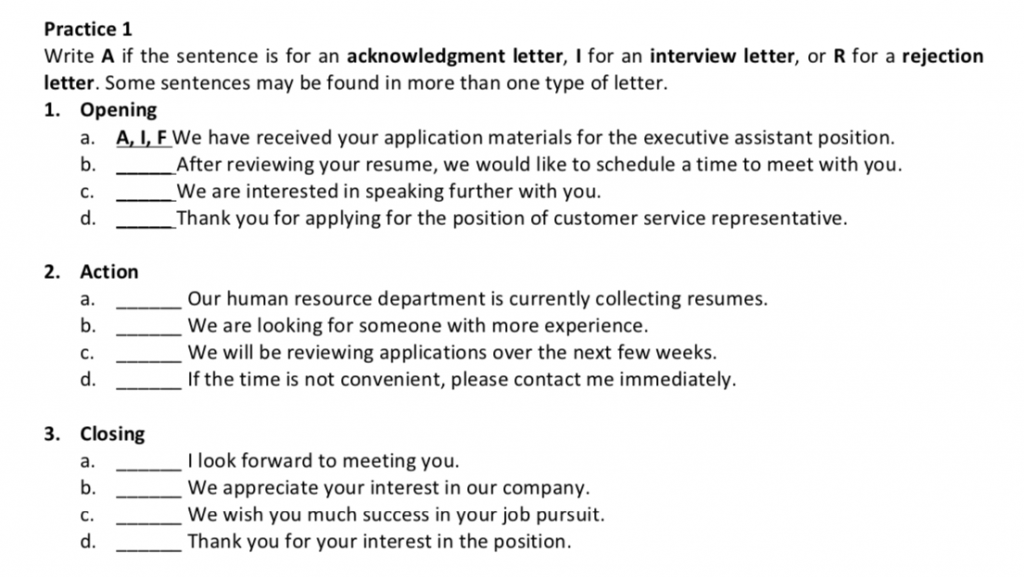
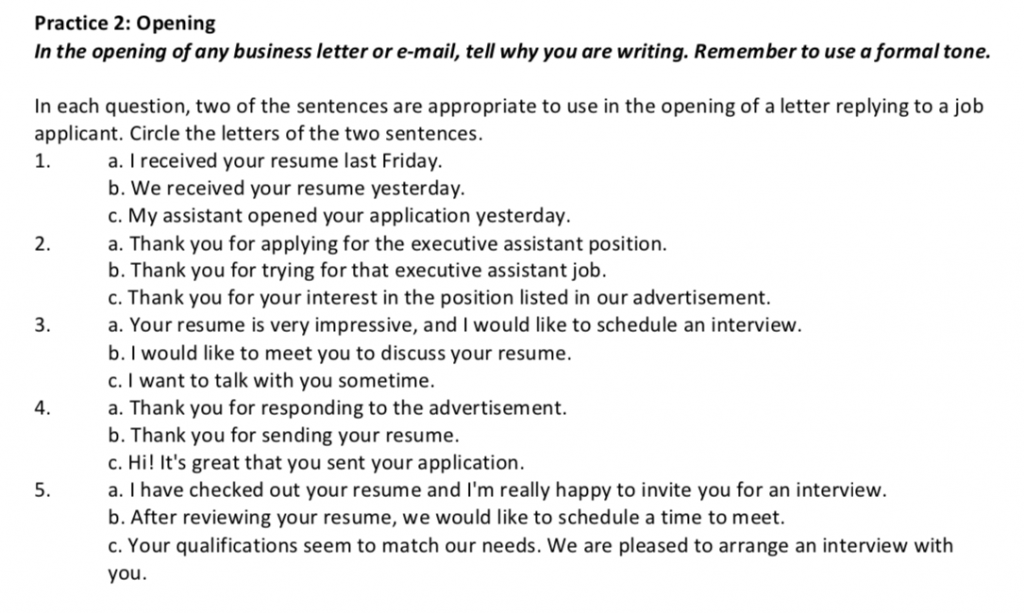
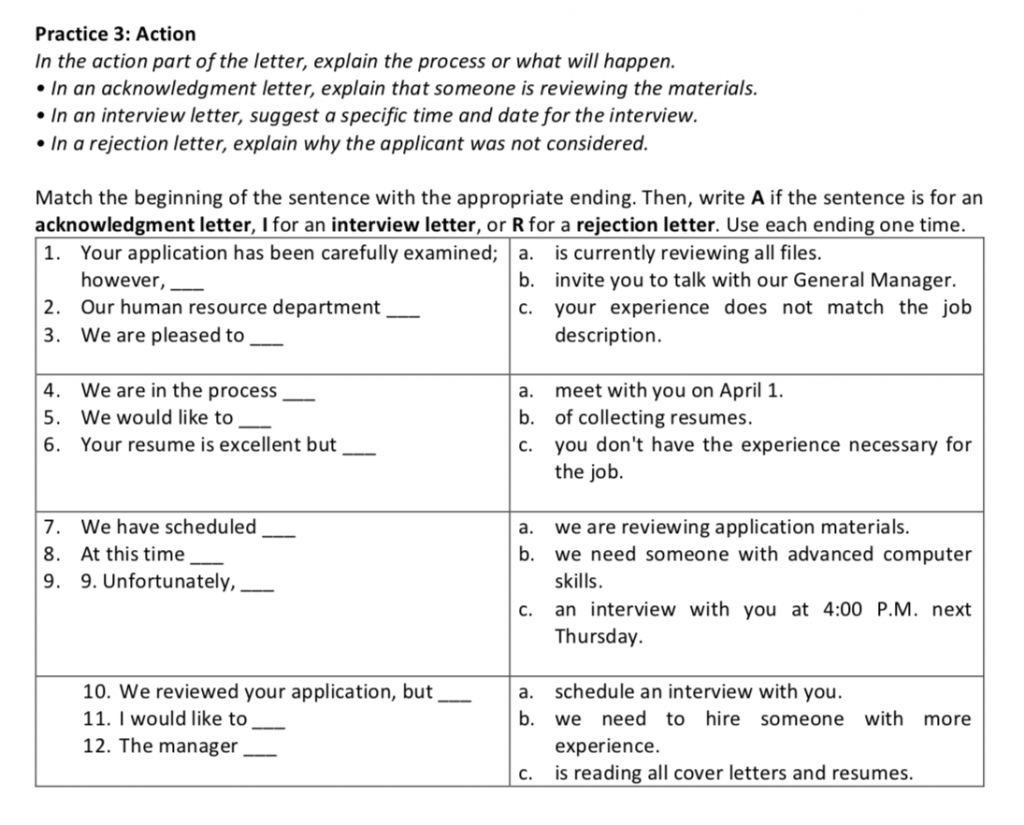
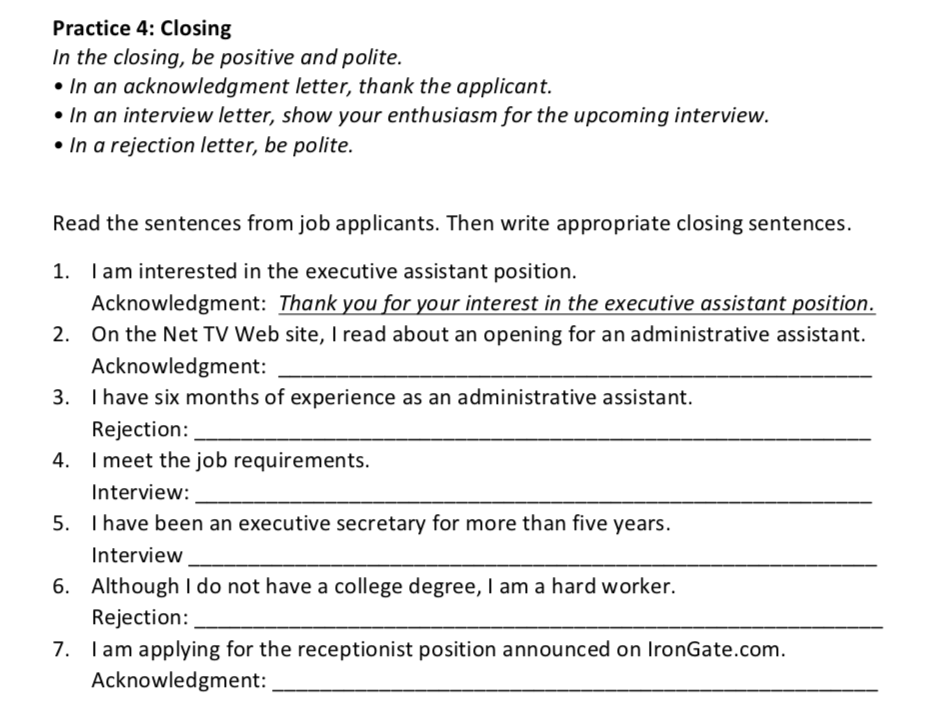
3. Writing customer relation letter, such as letter about change in company address, product promotion, and product recall.
Expressions on Writing Customer Relations Letters
Practice 1. Writing letter on change in company address
Giving Details
When you tell customers about a change, be sure to say when the change will happen. Give as many details as possible.
| Does not include details | We are moving our office. |
| Includes details | As of March 1, we are moving our Malaysian Office….. Please note the new address. |
Read the following openings for letters announcing a change in a company. Write which detail is missing.
1. We are moving our main office in May. Please note our new address.
Sample answer: What day in May?___________________________________________
2. Two of our five European offices are closing on June 1.
_______________________________________________________________________
3. Someone will call you on May 1 to discuss your new account.
_______________________________________________________________________
4. On July 15, our Madrid office is moving.
_______________________________________________________________________
5. Our telephone number is going to change to (768) 555-8979
_______________________________________________________________________
Time Markers
Time markers are words or phrases that relate to time. When you use time markers to talk about something that is going to happen, use the future tense [will + simple present tense verb].
| Your new account manager, Aninda Utami, will contact you shortly to introduce herself and to answer any questions you might have. |
Your initial correspondence should mention a follow-up plan of action. This plan is usually written in the future and a time is specified.
Here are some examples of time markers.
| shortly soon tomorrow in a few days within two weeks | in the near future within the month after the holidays by the end of the week at the beginning of next month |
Rewrite the sentences using the future tense. Then circle the time markers.
1. The new sales director (be) in touch with you after the New Year holidays.
The new sales director will be in touch with you after the New Year holidays._______
2. I (call) you in a few weeks to discuss your concerns.
______________________________________________________________________
3. You (receive) an e-mail tomorrow from our new branch manager.
______________________________________________________________________
4. Customers (receive) an invitation to visit our new offices soon.
______________________________________________________________________
5. We (send) our new office directory so it will arrive before the end of the year.
______________________________________________________________________
Practice 2. Writing letter on product promotion
Being Specific
The information in a customer relations letter should be as specific as possible.
| Not specific | We’ll give you a discount. |
| Specific | Take an additional 15% off all orders placed on our Web site this month. |
a. Choose the sentence that is more personalized and specific!
- a. Dear customer:
b. Dear Ms. Utami: - a. All orders taken in December earn 15% off.
b. You could save thousands! - a. We will pay for shipping and handling for all orders over $2,000.
b. Some customers will save on shipping. - a. Printer stands take an additional 10% off.
b. Some computer furniture has additional savings. - a. Thank you for being our customer.
b. As a Gold Card customer, you are our most valued client.
Being Positive
A company’s image is built up and promoted in its correspondence by using positive statements about the company.
| Less positive | Electronix stands behind its products. |
| More positive | Remember that Electronix gives an unconditional guarantee on all products. |
b. Choose the statement that is more positive!
- a. At Grand Office, you can buy anything you need for your office.
b.Grand Office is Asia’s number one supplier of quality office furnishings. - a. We select each item we carry individually, to ensure quality and value for our customers.
b. We buy from suppliers who sell many fine items. - a. Our goal is to have happy customers who return to us year after year for all of their office furnishing needs.
b. Our goal is to keep you satisfied so that you will want to shop with us again. - a. We are looking for a few more customers.
b. Our company and our success are built on customers like you.
Practice 3. Writing letter on product recall
Being Informative
A product recall is a serious matter. Be sure to include all of the important details regarding the recall. In particular, answer the questions What? Why? When? Where? and How?
| What | We are recalling the Photophone 642. |
| Why | A chip in the product is defective and will be replaced. |
| When | We ask that you return all phones to us by January 31. |
| Where | Send them to our main distribution center. |
| How | Please use overnight express, two-day air, or registered mail. |
a. Write which question these statements answer: What, Why, When, Where, or How.
- __________ The internal antennae are defective.
- __________ We are recalling wireless phones, model number 5342.
- __________ Please return all phones by March 15.
- __________ The shipment should be sent overnight express.
- __________ Direct all inquiries to our customer service representatives.
Commas with Lists
Use a comma to separate three or more items in a list.
| Please use overnight express, two-day air, or registered mail. [I] [2] [3] |
Some people do not use a comma before or and and between the last two items in a list. In this book, we use a comma. If you decide not to use this comma, make sure you are consistent within each piece of writing. If you use the comma in one sentence in a letter, then use it in other similar sentences.
b. Add commas to separate the items in each sentence!
- Shipping handling taxes and return mailing fees will be covered.
- Please return all pagers mobile phones and wireless devices whose serial numbers begin with S.
- As always, we offer you quality goods competitive prices and professional service.
- Our engineers have discovered defective screens keyboards and antennae.
- We are recalling the following models: number 4251B number 43D8C number 62S2B and number 58D8C.
- Please call Mr. Tandoko, Ms. Utami, or Ms. Sevia if you have any questions.
- We will be moving our office changing our phone number and updating our mailing list on January 2.
4. Writing employee relation letter, such as letter of reference, employee announcement, and letter of introduction.
Practice 1. Body Parts
Decide the body part of each sentence below. Write O if the sentence is for the opening, F for focus, A for action, or C for closing!
| No | O/F/A/C | Sentence |
| 1 | Ms. Latuconsina handled travel arrangements for seven executives. | |
| 2 | I am writing this letter on behalf of our employees, Mr. Tambolon | |
| 3 | She has the skills and the energy to succeed in whatever she pursues. | |
| 4 | Mr. Pratama maintained steady sales even when the market was slow. | |
| 5 | I highly recommend Miss Anisa as a graphic designer. | |
| 6 | Mr. Tandoko will surely become a leader in our region’s fight to save the environment. | |
| 7 | This serves as a letter of reference for Marlina Dwi, my former assistant. | |
| 8 | Ms. Ratih has my recommendation as a reliable trustworthy employee |
Practice 2. Opening
a. Read these opening sentences for letters announcing a new employee. Then circle the letter of the sentence that gives a relevant detail about the employee!
- We are pleased to introduce Kevin Aditya, the new director of marketing.
a. He was born in Biolivia.
b. He was the director of marketing for BT&T for nine years. - Our search for a translator has finally paid off; Citra Puspita will arrive from Indonesia on the 19th.
a. Citra speaks Indonesian, Korean, French, and English fluently.
b. Mr. Rizki is arriving on flight 459 from Seoul. - The legal department is pleased to announce that it has found an international copyright lawyer, Eva Rahayu.
a. Mrs. Rahayu specializes in trade, copyright, and patent law.
b. Mrs. Rahayu will be paid in U.S. dollars. - Many of you have already met Mr. Wahyu Nugroho, our new assistant director of public relations.
a. Mr. Nugroho studied international marketing at the West Bengal School of International Business.
b. Mr. Nugroho also interviewed for the director position, but he was too inexperienced for that position. - All of us here at Horton & Sloane extend a big welcome to Safia Gunadi, our new travel coordinator.
a. Ms. Gunadi loves to travel.
b. Ms. Gunadi was the manager at Mira Travel Services for ten years.
b. Read these opening sentences for letters of introduction. Then circle the letter of the closing sentence that best restates the main idea!
1. My assistant, Arin Handayani, will be in Hong Kong next week to meet with all of the branch managers.
a. Ms. Handayani looks forward to meeting you in person.
b. Ms. Handayani has been working for me for ten years now.
2. Mr. Perdana hopes to tour both of your production facilities in Thailand when he is there next month.
a. Thailand is a possible location for our fifth production facility.
b. Thank you for arranging his tour of your plant.
3. Anna Marisa will speak to your department about her success in moving from a local to a national marketing campaign.
a. I know that Ms. Marisa’s speech will be both enjoyable and informative.
b. Ms. Marisa has been a great asset to our marketing department.
4. This letter will introduce our new technology manager, Arief Dermawan, who will be calling you with questions about your technology needs.
a. I appreciate your taking the time to answer Mr. Dermawan’s questions.
b. As you know, we searched for a technology manager for months before promoting Mr. Dermawan.
5. Our human relations director will be speaking on the importance of multilingualism in new employees.
a. Her speech will begin at 3:00. I look forward to seeing you there.
b. Have you considered studying another language?
6. Thank you for agreeing to meet with my uncle when he is in Malaysia.
a. My uncle is looking forward to your afternoon together.
b. My uncle met his wife while he was stationed there.
Practice 3. Focus
Letters of reference describes employees and how they work. These letters often contain many adjectives and adverbs. Remember that adjectives describe nouns, and adverbs, describe verbs.
| Incorrect | She was efficiently. |
| She completed her projects verry accurate. | |
| Correct | She was efficient. |
| She completed her projects very accurately. |
a. Choose the correct adjectives and adverbs to complete the sentences!
- Ms. Larasati performed all of her duties professional/ professionally.
- She was efficient/ efficiently in preparing and mailing correspondence.
- He types quickly and accurate/ accurately.
- Miss Anggraini designed an attractive/ attractively brochure for a major client.
- He communicates effective/ effectively with both clients and co-workers.
- All of her projects were on schedule because her documentation was always complete/ completely.
- I high/ highly recommend Mr. Sasongko for any engineering position.
- Mr. Uwais is very honest/ honestly and loyal.
- I will be happy/ happily to answer any questions about Ms. Hanindya.
- He had full/ fully responsibility for the department’s budget.
When you refer to a specific past time, use the simple past verb form. When you refer to an unspecified past time, use the present perfect verb form. The exact time is not important.
| Simple Past | She worked at the Prima Bank from 1984-1992 |
| Present Perfect | She has worked at the Prima Bank, Kreativ Agency, and the Asia Foundation. |
b. Choose the correct verb form to complete the sentences!
- He served/ has served the company well, and we will be sad to see him go.
- From 2001-2002, Ms. Raditya participated/ has participated in a government-sponsored program researching recent cell phone technology.
- Ms. Bramantyo worked/ has worked as the director of design for women’s clothes at Husseby’s for six years.
- She designed/ has designed many award-winning business suits.
- Asri won/ has won the prestigious D.A.R. Engineering Award 1999.
The expression not only . . . but also emphasizes that more than one item is related to a topic. Not only . . . and . . . but also are placed directly before the parallel elements they join in the sentence.
He not only is hard working but also is a great golfer.
[verb] [verb ]
c. Combine the sentences using the expression not only . . . but also.
- She is outgoing and energetic. She is one of the friendliest people I know.
She not only is outgoing and energetic, but also is one of the friendliest people I know.
- He designed the new product. He designed the marketing slogan.
_________________________________________________________________
_________________________________________________________________
- Allen is a fair manager. Allen is a caring manager.
_________________________________________________________________
_________________________________________________________________
- She works harder than anyone I’ve ever met. She plays golf with complete devotion.
_________________________________________________________________
_______________________________________________________________
- He would like to tour your main offices. He would like to see your production facility.
_________________________________________________________________
_________________________________________________________________
- You will enjoy meeting each other. You will have a lot in common.
_________________________________________________________________
_________________________________________________________________
5. Writing personal business letter, such as letter expressing thanks, letter expressing congratulations, and letter expressing condolences.
Expressions on Writing Personal Business Letters
Practice 1. Writing letter expressing thanks
Write O for Opening, F for Focus, A for Action, or C for Closing.
1. __ Thanks for everything you did to make my first trip to Taiwan so enjoyable.
2. __ I look forward to the opportunity to do you a similar favor.
3. __ Again, I want to thank you for your kind and generous contribution.
4. __ Your intern program gives students an opportunity to learn about the Internet.
5. __ The entire staff join me in thanking you for sponsoring our weekend retreat.
6. __ I must again say thanks for your support. It means a lot to me.
7. __ The enclosed bonus check is a small token of my appreciation.
8. __ The project was very difficult, but you and your team did a wonderful job.
Practice 2. Writing Letter expressing Congratulations
a. Read these opening sentences for letters of congratulation. Then circle the letter of the closing sentence that best restates the main idea of the letter.
1. Congratulations on your retirement.
a. When you first came to Acme, you worked in the mail room.
b. Thank you for your many years of fine service to Transcorp, Inc.
2. Let me congratulate you on the opening of your new offices in Indonesia.
a. Your new branch in Bandung shows that your hard work has paid off.
b. The region should provide you with a lot of opportunities.
3. Congratulations on being the region’s top sales rep this year.
a. Your sales were over one million dollars this year.
b. Given your hard work, you deserve this fine honor.
4. We congratulate you on winning the Customer Service Award.
a. We want to thank you ourselves and tell you how pleased we are that your work has been recognized.
b. We are just one of your new, and fully satisfied, customers.
5. All of us here at Radit and Tama congratulate you on being made partner.
a. When you were an intern here with us, we knew you would be a great lawyer.
b. Being made partner is a privilege that you richly deserve.
Giving Praise
When you praise someone in a letter of congratulations, be specific. Avoid less specific words like really, good, great, very, and a lot.
| Not specific | You did a really good job for Commercial Bank. |
| Specific | Your many years of diligent service to Commercial Bank, and to the other banks where you’ve worked, show your commitment to quality banking in Jogja. |
b. Choose the sentence that is more specific
- a. You were a good teacher, and I learned a lot from you.
b. Your detailed explanations helped me learn more effectively. - a. Your sales record looks really good, and your customers must be very happy.
b. With the highest European sales for the year, you are clearly keeping your customers happy. - a. Your keen sense of timing and your careful research into market trends have made you one of Keeton’s top marketers.
b. You are really good at marketing and do great research, so we voted you as the best marketer at Keeton’s. - a. It was obvious to me that your interpersonal skills and knowledge of the industry would not go overlooked
b. So somebody recognized your talents, did they? - a. Just as your offices are in other countries, your new Rome branch officewill soon be a market leader.
b. Rome is a good place to be so your new office might just be a big success. - a. It was a really good idea to promote you.
b. The entire team at Bombay Exports will benefit from your promotion
Practice 3. Writing Letter expressing condolences
Personal versus Professional
When sending a letter of condolence to a business associate, you can make the letter personal by using I or professional by using we. We includes your associates at work.
| Personal | I’m sorry to hear of your father ‘s death. |
| Professional | We’re sorry to hear of your father’s death. |
In a personal business letter, a writer who knows the recipient well may use an informal style. For example, you can use a first name followed by a comma in the salutation (Dear Tania,) and you can use contractions (I’m).
a. Rewrite the sentences. Change the focus of the sentences from professional to personal.
- The news of your father ‘s death came as a surprise to us. You told us that he was sick, but his death must still be a shock.
- Our thoughts and sympathies are with you as you mourn the loss of your father.
- We hope that fond memories of him will help you through this difficult time.
- My colleagues and I would like to extend our sympathy during this difficult time.
- Please know that you have been in our thoughts, and accept our heartfelt condolences for your loss.
Preposition
Be careful not to use the preposition to where you should use at or of
| Incorrect | I’m sure you have many good memories of your father, and when you think to him, you can take comfort in these memories. |
| Correct | I’m sure you have many good memories of your father, and when you think ofhim, you can take comfort in these memories. |
b. Circle the prepositions in the sentences. If the preposition is wrong, correct it using at or of. Not all the prepositions are wrong.
- I remember meeting your mother to your firm’s tenth anniversary party.
- Although I knew your father had been ill for a long time, I was surprised to hear to his passing.
- He was very proud to you, and he always wanted to talk about your success.
- All of us will miss her sense to humor and her ability to get us all to work harder.
- I will be to my son’s wedding, so I can’t come to the memorial service.
- I will see you at the memorial service.
- Everyone here at Sharma Industries was proud to your wife’s success.
- I often think to the time when your parents came to the office
6. Requesting a service.
Practice 1. Body Parts
Decide the body part of each sentence below. Write O if the sentence is for the opening, F for focus, A for action, or C for closing.
| No. | O, F, A, or C | Sentence |
| 1. 2. 3. 4. | I look forward to your response. We expect 25 participants. Please call me to confirm the rooms by next Friday. I’m sending you confirmation today of the details that we discussed. | |
| 5. 6. 7. 8. | We are holding our annual meeting and I would like to get information about your facilities. I will get back to you by COB April 1 with the names of the participants. I look forward to your phone call. In addition to the meeting rooms, we will reserve five guest rooms. | |
| 9. 10. 11. 12. | We now need chairs and tables for 35 attendees. I would like to confirm the information that we discussed on the phone today. We look forward to meeting with you. Are you available to meet on Thursday at 3:00? | |
| 13. 14. 15. 16. | I would like you to confirm the menu by the end of the week. I await your confirmation. We will need a buffet lunch for Monday, Tuesday, and Wednesday. I would like to receive information about your conference facilities. |
Practice 2. Opening
The opening of the letter is explaining the reason why you are writing. Often, when requesting a service, you are following up on a previous conversation, so you need to make specific reference to the earlier communication.
Use the prepositions at, by, for, in, of, or on to complete the sentences below. Some of the prepositions may be used more than one time.
- Thank you ____ your telephone call this morning.
- We would like to hold our meeting ___ Jakarta Convention Center.
- Please e-mail the menu ___ Wednesday morning.
- We will need sixty chairs ____ the large room.
- I would like a list ____ rates for the meeting rooms.
- The meeting will end ____ July 14th.
Practice 3. Focus
A letter requesting a service’s focus is on letting the service provider know what you need. Thus, you have to be as clear and exact as possible.
Examples:
Not clear and exact We need some rooms.
Clear and exact We will need a total of four rooms: one large room and three smaller break-out rooms.
Choose the sentence that is clearer and more exact.
- a. We will need a microphone and speakers.
b. We need sound equipment. - a. Can you get back to me sometime?
b. Could you fax or e-mail me your response tomorrow? - a. Eighty people will attend the meeting.
b. Fewer than one hundred people will attend the meeting. - a. We are going to have a two-day meeting, March 15th and 16th.
b. We are going to have a meeting. - a. The training seminar will take place on March 15 and 16.
b. The training seminar will take place in March. - a. Would it be possible to have audiovisual equipment in the break-out rooms?
b. Would it be possible to have a monitor and VCR in each of the three smaller break-out rooms? - a. We’ll need a few rooms.
b. We will need a total of four rooms. - a. Could you e-mail or fax me your cost projections by tomorrow?
b. Could you e-mail me your cost projections ASAP?
Practice 4. Action
In the action part of the letter, you should give a time frame for some action to be done. You may promise to do something, or you may ask the recipient of the letter to do something. Again, it is important to be specific.
You also must be polite. It can be done by using would or could to ask someone to do something.
Examples:
I would also appreciate receiving the projected costs for our two-day meeting.
Could you fax or e-mail me your costs by January 31st?
Rewrite these sentences as polite requests using would or could. Add your own time frame.
1. Fax me the menus.
Would you fax me the menus by May 9th?
2. Send me the cost projections. ______________________________
3. Provide lunch. ______________________________
4. Open three additional rooms for break-out meetings. ______________________________
5. Give me the price per person for coffee breaks. ______________________________
6. Put audiovisual equipment in the three break-out rooms. ______________________________
7. E-mail me the cost per person. ______________________________
8. Get back to me on the dates of the training seminar. ______________________________
9. Add two more speakers in the large room. ______________________________
10. Tell me the total number of attendees. ______________________________
Practice 5. Closing
In the closing, you need to mention some further communication. The communication may be in the form of a phone call, a meeting, a letter, a fax, or an e-mail.
Write sentences using the expression I look forward to [+ -ing verb]. Use each type of communication listed below. Add a specific time.
1. receiving an e-mail
I look forward to receiving your e.-mail tomorrow.
2. receiving a fax
________________________________________________________________________
3. receiving a letter
________________________________________________________________________
4. receiving a phone call
________________________________________________________________________
5. meeting
________________________________________________________________________
7. Confirming a service.
Practice 1. Body Parts
In each question, two of the sentences are appropriate to use in a letter confirming a service. Circle the letters of the two sentences.
1. Opening
a. We are pleased to confirm the plans for your conference, March 12-13.
b. Did you need a place for your meeting?
c. I am confirming the arrangements for your company’s reception on May 11.
2. Focus
a. As you outlined in your fax, we can provide six large rooms equipped with microphones and speakers.
b. As you said on the phone, you will need one room that can be made larger or smaller.
c. I know you need many different services for your meeting.
3. Action
a. Please let us know a week before your conference begins whether you will need a technician’s assistance.
b. Our meeting rooms are very large.
c. We will fax the price estimates to you today.
4. Closing
a. We thank you for this opportunity to serve you.
b. I will fax the estimates tomorrow.
c. We are happy that you have chosen Sunburst as your event planner.
Practice 2. Personal Pronouns
Personal pronouns refer to something or someone mentioned before. In the model letter on this unit, Alex Wiyoko is writing to Arina Widya.
Examples:
Thank you for your January 28 letter expressing interest in Jakarta Convention Center.
you = Arina Widya
your = Arina Widya’s (letter)
This letter will confirm our subsequent telephone call discussing plans for your meeting.
our = Alex Wiyoko and the Jakarta Convention Center staff’s (plans)
your = Arina Widya and the Tokopedia staff’s (meeting)
Underline the personal pronouns in these sentences from the model letter. Write whether the pronouns refer to Arina, Alex, Turner/Jakarta Convention Center, or Arina/Tokopedia.
Arina Alex/Jakarta Convention Center
1. We understand your company would like to reserve our conference facilities.
2. As you requested, we will provide a microphone and speakers.
3. Please provide us this information.
4. As you requested, I faxed the projected costs last week.
5. I appreciate the opportunity to plan your meeting.
Practice 3. Sentence Order
The order of sentences in a paragraph helps the reader understand the meaning. Usually, a general statement or a restatement of the request comes before a specific statement about the request.
Example:
We will provide five tables and a monitor and VCR. Please let us know whether you want 6′ rectangular tables or 4′ round tables.
Match the general restatement with the specific statement.
a. We will provide a VCR in each room.
b. There will be a computer projection system in the auditorium.
c. Coffee breaks will be provided between the morning sessions.
d. You requested five rooms for your meetings.
e. You will need 50 chairs.
1. b We need your computer’s model and operating system by Friday.
2. __ We will need to know the day before the conference whether you would like the chairs set up theater style or horseshoe style.
3. __ Let us know Monday which VCR format (NSTC or PAL) you need.
4. __ We have rooms in four different sizes: rooms for 10, 30, 60, or 100 people. Which sizes would meet your needs?
5. __ We can also provide cake and cookies at this time. Please complete the catering request form and send it to us by June 3.
Practice 4. Whether … or/either … or/if
When you give a choice to a client, you must be clear. Whether … or, either … or, and if are used in sentences with a choice.
Example:
Please let us know whether you want 6′ rectangular tables or 4′ round tables.
Write sentences that give choices for these general restatements.
1. We will provide lunch on the first day. (buffet or served lunch)
Please let us know whether you want a buffet or a served lunch.
You can have either a buffet or a served lunch.
Please let us know if you want a buffet or a served lunch.
2. There will be two tables in each room. (rectangular or round)
_______________________________________________________________________________________________________________________________________________________________________________________________________________
3. You requested a VCR for each break-out room. (NSTC or PAL format)
_______________________________________________________________________________________________________________________________________________________________________________________________________________
4. I am faxing you menus for the three meals and coffee breaks. (coffee breaks in morning, afternoon, or both)
_______________________________________________________________________________________________________________________________________________________________________________________________________________
5. We will put 100 chairs in the large room. (theater style or horseshoe style)
_______________________________________________________________________________________________________________________________________________________________________________________________________________
Practice 5. Gerunds and Infinitives
Some verbs can be followed by the -ing (gerund) form of a verb. Some verbs can be followed by the to (infinitive) form of a verb. Some verbs can be followed by either. In addition, a phrase that ends in a preposition (such as to, in, of, on, for, or at) is always followed by the gerund form.
Examples:
gerund infinitive
I appreciate having the opportunity to plan your meeting.
gerund
We look forward to showing you our facility when you visit this week.
Complete the sentences below with the correct form of the verb.
- I want to thank you for (let) letting Jakarta Convention Center plan your meeting. We look forward to (show) ___ you our facility.
- Jakarta Convention Center tries hard (win) ___ and keep your loyalty. If you have any questions, please do not hesitate (contact) ______ me.
- If you need (make) ___ any changes, please call me immediately.
- I enjoy (introduce) ___ people to our facility and I look forward to (give) ___ you a personal tour.
- Our staff is (make) ___ sure everything happens on schedule.
8. Writing claim/complaint letter.
Practice 1. Body Parts
In each question, two of the sentences are appropriate to use in a claim letter. Circle the letters of the two sentences.
1. Opening
a. Your shipment of file cabinets arrived damaged on March 12.
b. We only received two of the three cartons of copy paper that we ordered on April 10.
c. We would like to receive a catalog.
2. Focus
a. You will receive, by overnight courier, the incorrectly addressed software package.
b. Thank you for sending the pens, even if they were the wrong color.
c. I have returned the manuals to your attention.
3. Action
a. I would like you to cancel the order and credit our account for the two manuals we did not receive.
b. I would like to receive the two additional software packages by November 15.
c. Your company makes too many mistakes.
4. Closing
a. Don’t let it happen again!
b. Thank you for your attention to this matter.
c. I appreciate your taking care of this for me.
Practice 2. Formal versus Informal Style: Contractions
In business letters, you should always use a formal writing style. One point to remember is that you should not use contractions. Contractions are used in informal or personal correspondence.
Examples:
Informal We didn’t receive TM-0053-3 or TM-0056-7.
Formal We did not receive TM-0053-3 orTM-0056-7.
Informal We can’t complete your order because Item 42-A is back ordered.
Formal We cannot complete your order because Item 42-A is back ordered.
Underline the contractions in each sentence. Then rewrite the sentences without using contractions.
1. Please don’t add shipping and handling to the revised invoice.
Please do not add shipping and handling to the revised invoice.
2. We’re going to send back the incorrect invoice.
_____________________________________________________________________
3. We can’t approve your shipment.
_____________________________________________________________________
4. The order wasn’t received by the agreed upon date.
_____________________________________________________________________
5. If the item isn’t in stock, you may substitute another.
_____________________________________________________________________
Practice 3. Being Concise: Descriptive Adverbs
Business correspondence should be concise. Being concise means that you should use as few words as possible. One way to be concise is to use modifiers, such as descriptive adverbs.
Examples:
Not concise Our account was billed with a lot of different mistakes in it.
Concise Our account was incorrectly billed.
Rewrite these sentences to make them concise. Use the phrases below.
illegibly written incorrectly added insufficiently insured
poorly wrapped loosely packed
1. The label was written by someone with bad handwriting, which was impossible to read.
The label was illegibly written.
2. The package was wrapped in a very messy way.
_____________________________________________________________________
3. The items were all tossed into the box and the wrapping came off.
_____________________________________________________________________
4. The goods were not insured a sufficient amount to cover damages.
_____________________________________________________________________
5. The invoice had numbers that didn’t add up, and I even used a calculator.
_____________________________________________________________________
Practice 4. Using Dashes
A dash (-), or a pair of dashes, can sometimes be used instead of a comma, colon, or parentheses. Dashes can add information, show emphasis, or set off lists.
Examples:
Add information We are returning–under separate cover–the two copies of TM-0035-3.
Show emphasis The damaged packaged–the one sent by overnight mail–was refused by the recipient.
Set off lists The order form containing the information–date, time, and cost of the shipment–was delivered by messenger.
Rewrite these sentences using dashes.
1. These manuals (423 and 455) are not the ones we ordered.
These manuals—423 and 455—are not the ones we ordered.
2. Four packages, all from New Media Publishers, were sent to the wrong address.
_____________________________________________________________________
3. The final order form (the one. with so many changes) was difficult to read.
_____________________________________________________________________
4. The entire contents of the shipment were damaged: bookcases, chairs, and desks.
_____________________________________________________________________
5. All of the supplies were lost in transit: the books, paper, tape, and disks.
_____________________________________________________________________
9. Writing adjustment letter.
Practice 1. Body Parts
In each question, two of the sentences are appropriate for an adjustment letter. Circle the letters of the two sentences.
1. Opening
a. We have received your March 13th letter regarding the damaged file cabinets.
b. Thank you for your June 3rd fax detailing the items missing from our shipment.
c. I’m sorry we don’t have any recent catalogs.
2. Focus
a. The post office has been making many mistakes lately.
b. Please accept our apologies for the inconvenience.
c. I’m sorry that we did not fill your order to your satisfaction.
3. Action
a. We don’t have what you need, so try another company.
b. The pencils you ordered have been shipped in the color you requested, along with a complimentary pencil sharpener.
c. You will receive by overnight courier the latest version of the accounting package.
4. Closing
a. Next time, spend more for shipping and this won’t happen.
b. Let me say again how much we regret any inconvenience.
c. We cannot apologize enough. Your satisfaction is very important to us.
Practice 2. Adjustment Letter Actions
Most adjustment letters have one of these three actions.
refund The business sends the customer’s money back.
replacement The business sends the customer the same item or a similar one in perfect condition.
credit The business sends the customer a credit to purchase other items that cost the same amount.
These are the three most common actions, but other options are possible. For example, the business could give the customer a choice, or the business could give nothing. Each situation is different.
Write refund, replacement, or credit for each sentence.
1. refund You will receive a check for the full amount in the mail.
2. ______ Please return the software package and select another one.
3. ______ Forty-five dollars ($45.00) was credited to your account.
4. ______ The money will be sent to you tomorrow.
5. ______ Please choose another color for your desk.
6. ______ We are out of that particular item, but please select something else from the catalog.
Practice 3. Apologies and Actions
An adjustment letter begins with acknowledging the mistake. Then the writer apologizes, suggests an action, and apologizes again.
First apology We apologize for the error.
Action Two manuals-TM-0053-3 and TM-0056-7-have been sent to your attention under separate cover. In this letter, I have enclosed a discount coupon for ten percent off your next purchase. In addition, a revised invoice is enclosed. We have also deducted the cost of shipping and handling.
Second apology Again, we regret the error and apologize for any inconvenience.
Write an apology or action for each sentence.
1. action You may exchange the item at your convenience.
2. ______ I regret any inconvenience.
3. ______ You will receive a refund for your shipping costs.
4. ______ Please accept this discount coupon.
5. ______ I am sorry that the item you ordered was not in stock.
6. ______ A new fax machine will be sent to you.
Practice 4. Number in Sentences
A number that starts a sentence should be spelled out. You can also rewrite the sentence with the number coming later. Review Clarifying Numbers in Unit 8 (Providing Information). Remember that it is sometimes better to use both numbers and words.
Examples:
Incorrect 2 manuals have been sent to your attention.
Correct Two manuals-TM-0053-3 and TM 0056-7-have been sent to your attention.
Two (2) manuals have been sent to your attention.
We have sent two (2) manuals to your attention.
Rewrite the following sentences to correct the numbers.
1. $65.00 will be sent to you by check.
A check for $65.00 will be sent to you. or
Sixty-five dollars will be sent to you by check. or
Sixty-five dollars ($65.00) will be sent to you by check.
2. 3 CDs were replaced.
_____________________________________________________________________
3. 12 accounting packages have been sent to your attention.
_____________________________________________________________________
4. $1,000 will be credited to your account.
_____________________________________________________________________
5. 2 manuals have been sent under separate cover.
_____________________________________________________________________
6. $80 will be given to you as a store credit.
_____________________________________________________________________
10. Requesting information.
Practice 1. Body Parts
In each question, two of the sentences are appropriate to use in a letter requesting information. Circle the letters of the two sentences.
1. Opening
a. We have learned from our supplier, Hytera Indonesia, that you are producing a new car radio.
b. What’s new?
c. In the September issue of Travelia Indonesia, you announced the opening of your new hotel.
2. Focus
a. For forty-five years, we have supplied schools around the world with audiovisual equipment.
b. Our company is the leading distributor of electronic equipment.
c. We need no introduction.
3. Action
a. Would you please send me a copy of your latest price list?
b. If possible, I would like to have your catalog.
c. Send me something, please.
4. Closing
a. I appreciate your prompt attention to my request.
b. Could you send it quickly?
c. Thank you in advance for sending the brochures.
Practice 2. Preposition of Place
Prepositions of place tell where you heard about something. In is used for print sources, such as newspapers, journals, and magazines. On is used for all other media sources, such as radio, TV, and the Internet.
Examples:
My colleagues and I read the announcement in the March.17 CNN Indoneia.
I heard with interest your commercial on radio station Hard Rock.
Complete these sentences. Use the prepositions in or on.
1. I read ___ the April 3rd The Jakarta Post about your new computer, the Magna Pc.
2. My manager saw a report ___ CNN that your new model is being introduced this month.
3. ___ the January issue of Reader’s Digest, I learned that you have developed a new laser printer.
4. I would like more information about the cellular phone listed ___ your spring catalog.
5. We heard about your software, Add Up, ___ BBC News Today.
6. I saw an article about your company ___ the Internet.
Practice 3. Sentence Fragments
All sentences in a letter must be complete sentences. A sentence fragment is a sentence that is not complete.
There are three types of sentence fragments.
Missing a noun Is the largest seller of digital cameras in Indonesia.
Missing a verb Our company the largest seller of digital cameras in Indonesia.
Dependent clause Which is the largest seller of digital cameras in Indonesia.
Complete sentence Our company is the largest seller of digital cameras in Indonesia.
Write S if the sentence is a complete sentence. Write F if the sentence is a fragment. Rewrite the fragments to make sentences.
1. F Our company the leading producer of computer keyboards.
Our company is the leading producer of computer keyboards.
2. __ For the last ten years, we have had over 50 percent of the market.
_____________________________________________________________________
3. __ Our main office and its branches, which are located on every continent, can your company promote its products.
_____________________________________________________________________
4. __ Since 1959, have been the major supplier of electronic equipment for hospitals.
_____________________________________________________________________
5. __ As the largest provider of Internet services, we have put businesses all over the country on the Web.
_____________________________________________________________________
Practice 4. Requests
In business letters, you must always be polite. You should make requests rather than give commands.
Command Have your sales representative call me.
Request I would appreciate having your sales representative call me.
Command Tell me about your camera.
Request Would you please tell me more about your camera?
Here are some suggestions used in polite requests:
Could you possibly …
I would appreciate it if you would/could …
I would be grateful if you would/ could …
If it isn’t too much trouble …
If possible, would/ could you …
If you have the time …
May I ask you to …
Would/ could you please …
Would/ could you possibly …
Rewrite these commands as polite requests. Use a different expression for each sentence.
1. Send me a brochure about your new camera.
If possible, could you send me a brochure about your new camera?
2. Give me your most current prices.
_____________________________________________________________________
3. Have your sales representative call me.
_____________________________________________________________________
4. Tell me when the product is available.
_____________________________________________________________________
5. Fax me a list of distributors.
_____________________________________________________________________
11. Providing information.
Practice 1. Body Parts
In each question, two of the sentences are appropriate to use in a letter providing information. Circle the letters of the two sentences.
1. Opening
a. Thank you for your letter of June 3rd inquiring about our new Digicam digital video camera.
b. We are pleased to have the opportunity to respond to your request for more information on our digital cameras.
c. This is your last chance to buy a camera that uses film.
2. Focus
a. We wondered why you want a sales representative to call you.
b. The promotional materials you inquired about will be ready on Friday.
c. We are sending you, under separate cover, a distribution agreement.
3. Action
a. Part of our expanding product line is a mobile phone that takes and sends photos over the phone lines.
b. We hope you will continue to take good photos.
c. I am sending a catalog of software developed for our digital cameras.
4. Closing
a. I look forward to working with you in the future.
b. I’ll call you if we want to sell you a camera.
c. If I can answer any other questions, please call me on my direct line.
Practice 2. Clarifying Numbers
When you write numbers in a business letter, it is a good idea to spell out the number in words. Spelling out the number helps to clarify the information.
Example:
The camera will be available this October, and the cost will be approximately three hundred and fifty dollars ($350.00).
Here are some examples of spelling out numbers in letters.
Quantity Clarification
5 boxes five (5) boxes
10 gross ten (10) gross
Amount Clarification
$6.42 six dollars and forty-two cents ($6.42)
$3,500 three thousand five hundred dollars ($3,500)
These sentences have unclear information. Ask for clarification. Write out the number first and follow it with the number in parentheses.
1. Unclear The total is thirty-two dollars ($3.20).
Clarification Is the total thirty-two dollars ($32.00) or three dollars and twenty cents ($3.20)?
2. Unclear We will need six (60) boxes of printer paper.
Clarification Do you want six (___) boxes of printer paper or sixty (___) boxes of printer paper?
3. Unclear Please send us one (100) dozen brochures.
Clarification Do you need ___ (___) dozen brochures or ___ (___) dozen brochures?
4. Unclear We asked that payment be received no later than 01/02.
Clarification Is payment due by _____ 1st or _____ 2nd?
5. Unclear Please submit the report on the fifteenth of every month (for example, June 5).
Clarification Are reports to be submitted on the ___ (___) or the ___ (___) of every month?
6. Unclear I ordered four (40) boxes of envelopes.
Clarification Did you order ___ (___) or ___ (___) boxes of envelopes?
Practice 3. Commas and Conjunctions
Use a comma when you combine two sentences with a conjunction (that, and, or, nor, yet). The comma always comes before the conjunction.
Example:
The camera will be available this October, and the cost will be approximately three hundred and fifty dollars ($350.00).
Combine the following sentences into one sentence. Choose the correct conjunction and use a comma.
1. I am enclosing the price list with this letter. I am forwarding the catalog under separate cover. (and/or)
I am enclosing the price list, and I am forwarding the catalog under separate cover.
2. A sales representative will e-mail you. She will telephone you. (yet/or)
_____________________________________________________________________
3. We do not have the 999X camera. We have a newer model. (but/nor)
_____________________________________________________________________
4. We appreciate your order. We hope to work with you again. (or/and)
_____________________________________________________________________
5. The brochure is ready now. The camera will be sent next week. (yet/but)
_____________________________________________________________________
Practice 4. Also and In Addition
Use the words also and in addition when you write about more than one action. These words provide continuity and rhythm in a letter. Also comes before the action verb. In addition, it usually comes at the beginning of a sentence.
Examples:
I am forwarding a brochure.
I am also forwarding information on our new video camera.
In addition, I am enclosing a list of our distributors.
Write new sentences that provide continuity. Use the words provided.
1. I will be sending you our new brochure when it is available.
also free samples
I will also be sending free samples.
2. We are shipping the new cameras this week.
In addition the software
_____________________________________________________________________
3. I look forward to answering any questions you might have.
In addition to working with you in the future
_____________________________________________________________________
4. I am attaching a price list to this letter.
also an order form
_____________________________________________________________________
5. I am enclosing information on the camera you inquired about.
In addition information on our new video camera
_____________________________________________________________________
12. Ordering supplies.
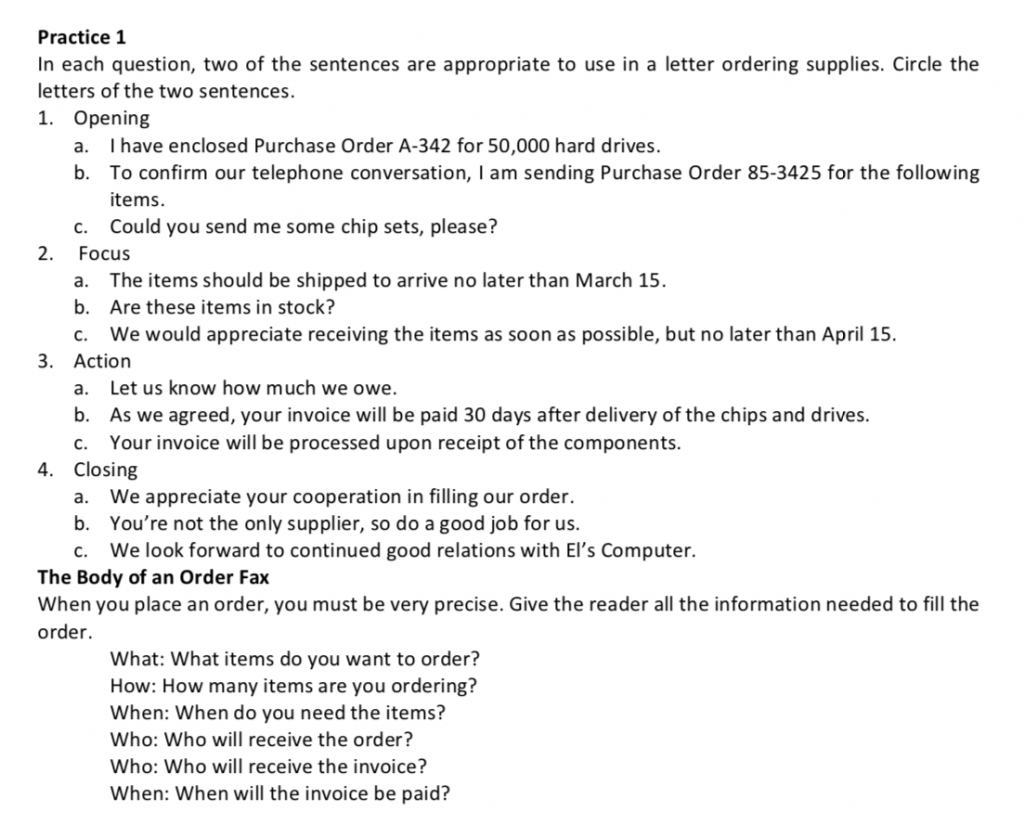
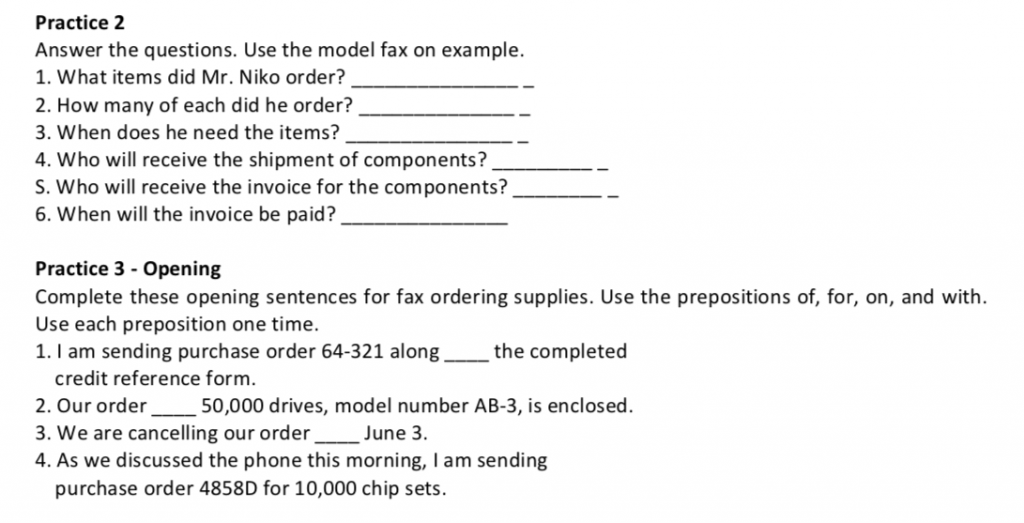
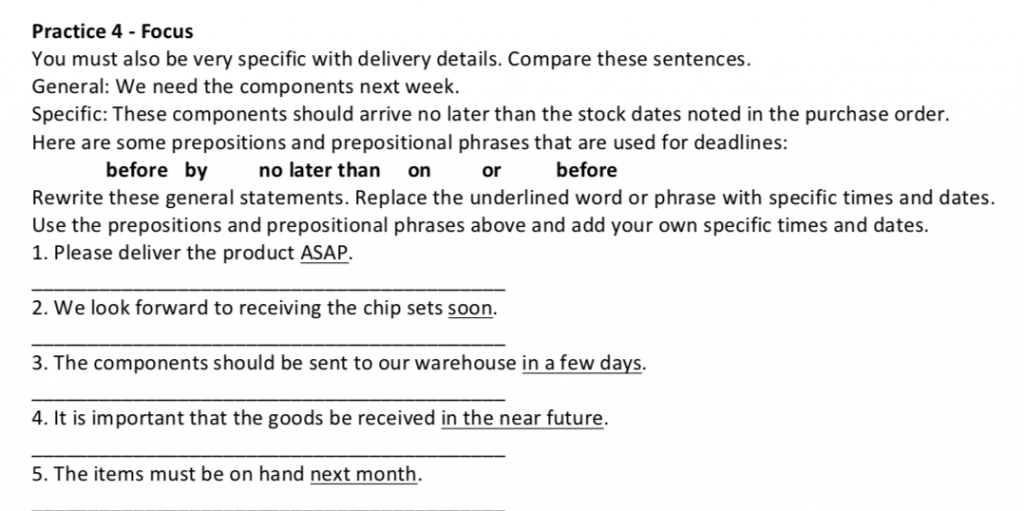
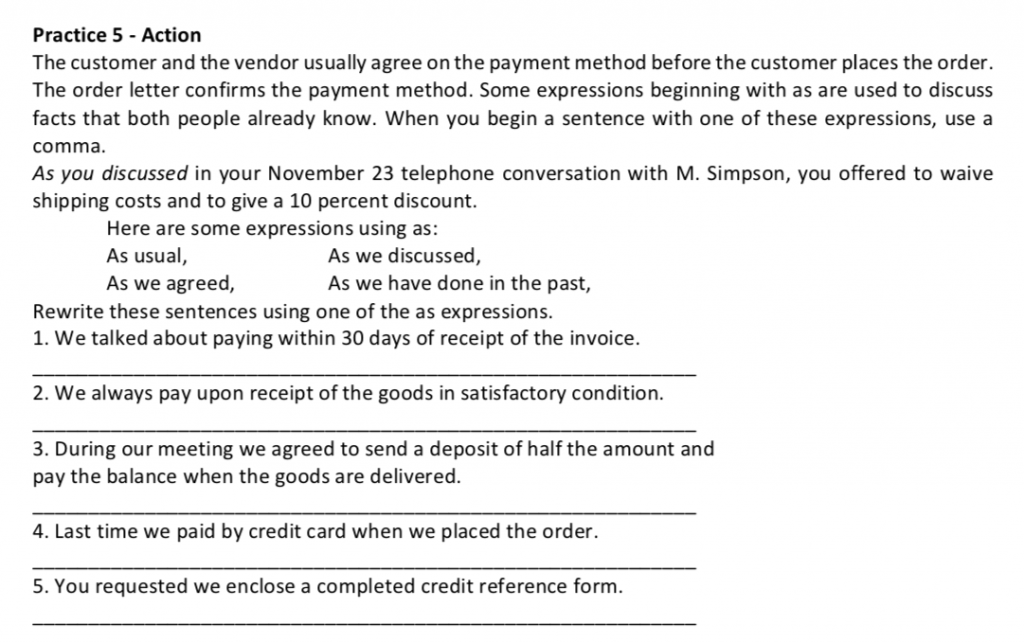
13. Confirming an order.
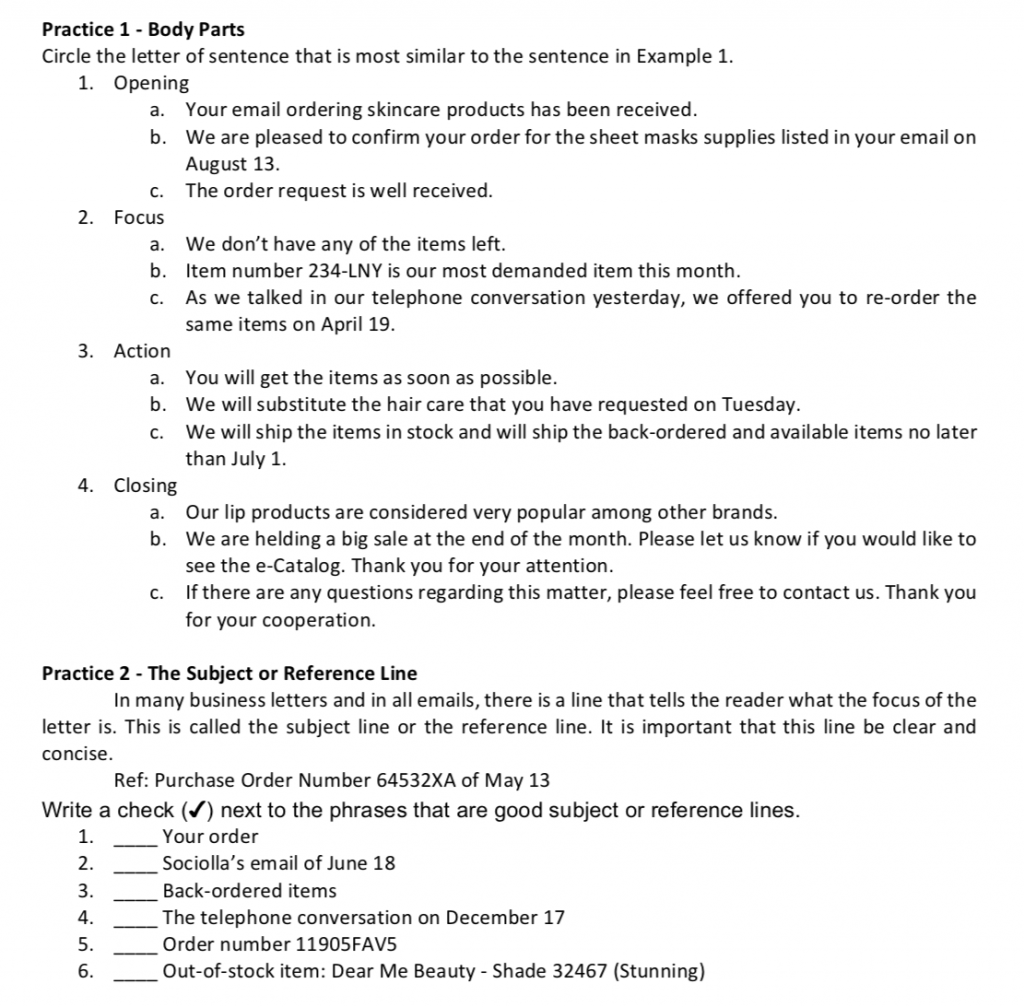
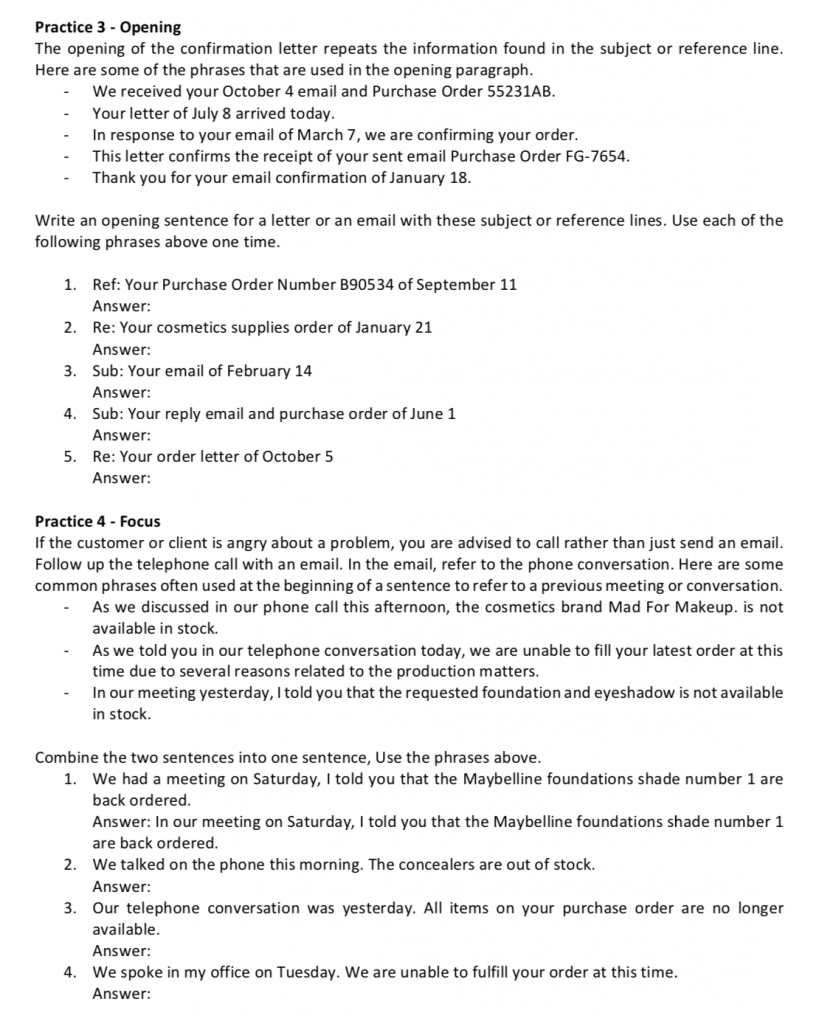
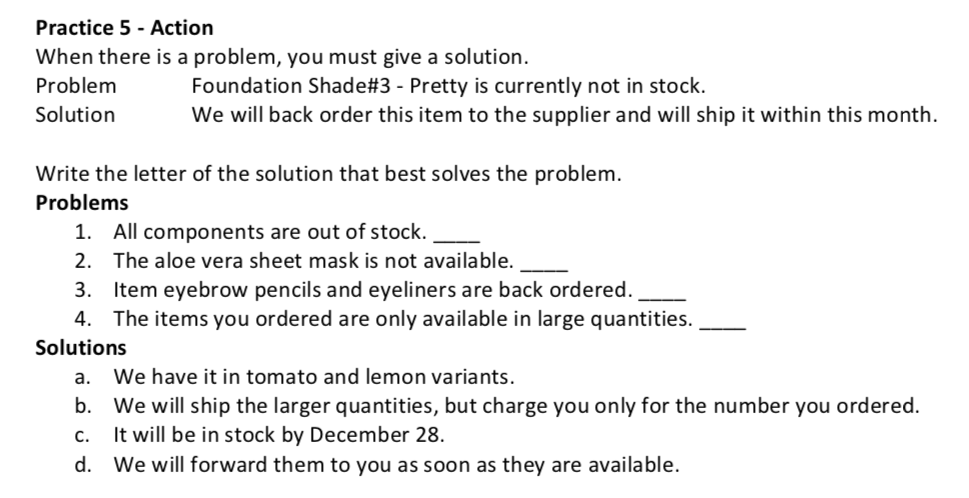
14. Memo.
FINAL FORMATTING TIPS AND TOOLS FOR MEMOS
- Think ahead about your reader, your message, and the best format and tools you can use to convey that message: Choose whatever you think best fits the situation. Include only that which you think will help you get the results you are hoping for.
- Use parallelism for consistency: Parallelism in writing is when topics and sub- jects correspond to one another in a logical way. This is particularly important when you are using any type of outline format, such as bullets and numbering. The key is to word everything in a similar style. For example, the bulleted list you are reading from right now has a directive tone that is parallel in structure—every lead sentence makes a recommendation of some sort. It would not make sense to have the final bullet say: Letters and memos can be difficult to write.
- Try not to overemphasize: If you EMPHASIZE everything,you emphasize nothing. Keep in mind the overall picture your letter or memo paints. If it looks like a jumbled mess, then that’s how you come across—and your message gets lost in a fog as thick as pea soup. So, avoid multicolored fonts, all capital letters, all italics, or any mishmash of words that looks sloppy. So, stand back from your letter once you are finished and see how you like it. Is it pro- fessional looking? Does it flow easily? Better yet, would you enjoy reading it? If you can answer yes to all of the above, then you are ready to send it!
- Keep your letters and memos to one page, two maximum: Anything longer than that starts becoming a report, which is fine, if that’s what it should be. It is okay to change your mind about a document while it is still in the works. So, whether you have composed a letter, memo, or report, just be sure that your finished product is accurate and edited before sending it.
- Write a second letter or memo for separate or related issues: One great way to keep your letters or memos short is to focus on one major topic at a time. If you need to discuss several different issues at length, then draft several different letters, each with a separate heading. Or, if you have an issue that is parallel to the one you are discussing, compose a separate letter to discuss it.
- Don’t make any changes that affect the readability of your letter: Don’t reduce the font size to where it is readable only with a magnifying glass just to keep your letter to one page. Either edit your text to fit onto one page, or make your letter two pages. Conversely, don’t make the font huge just to fill space— the letter just ends up looking like you did just that.
- Use attachments or URLs for detailing information: Anything in your memo that requires a detailed explanation should be presented as an attachment, or a Web link. You can attach as many separate documents as you need, as long as you refer to your attachment(s) in your memo. Be sure to maintain some sense of logical order in your attachments, as you don’t want to send a confus- ing stack of documents. Use this tool to support, clarify, and provide statistical or evidentiary backup for your memo.
- Use boxes, tables, charts, or graphs to support your point: Whatever you think will draw attention to your subject, or will clarify it for your audience, is a good tool to use. However, you should use these sparingly, or your message will get lost in a sea of shapes and shading.
- Choose from these commonly used formatting tools: a descriptive subject line in bold print, a direct statement of purpose as an opener, compelling points in bold in the body of the document, bullets and numbers as needed, blank space to separate issues, italics, quotes, and underlining.
15. Writing reminder/collection letter.
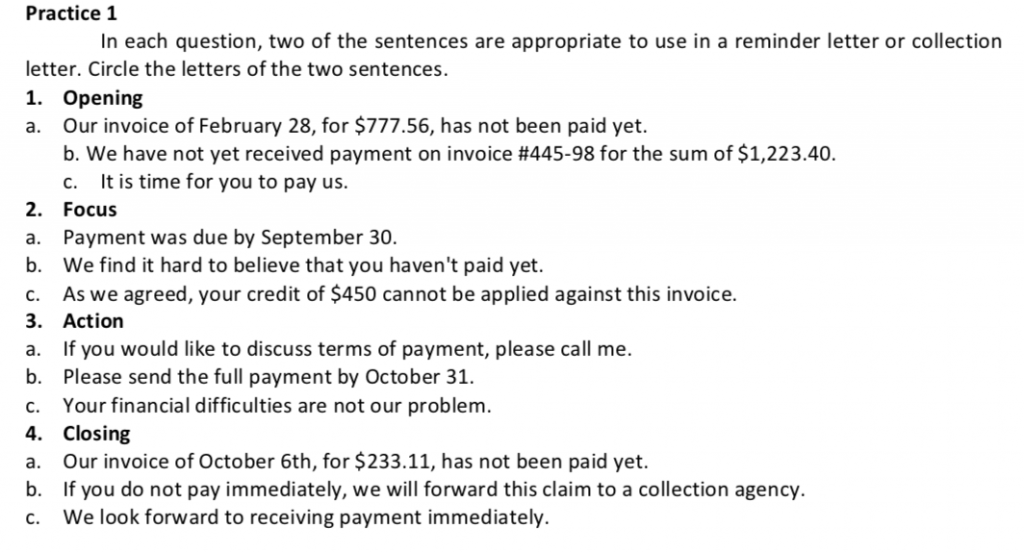
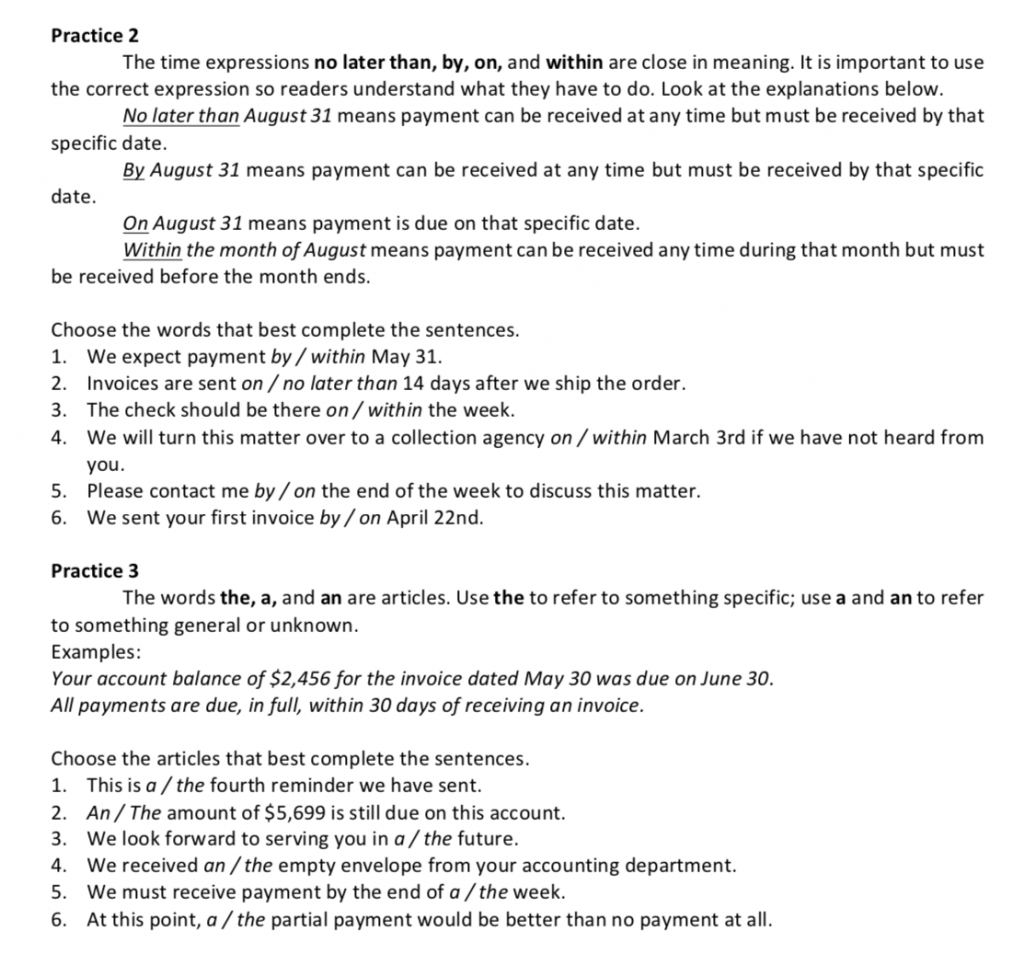
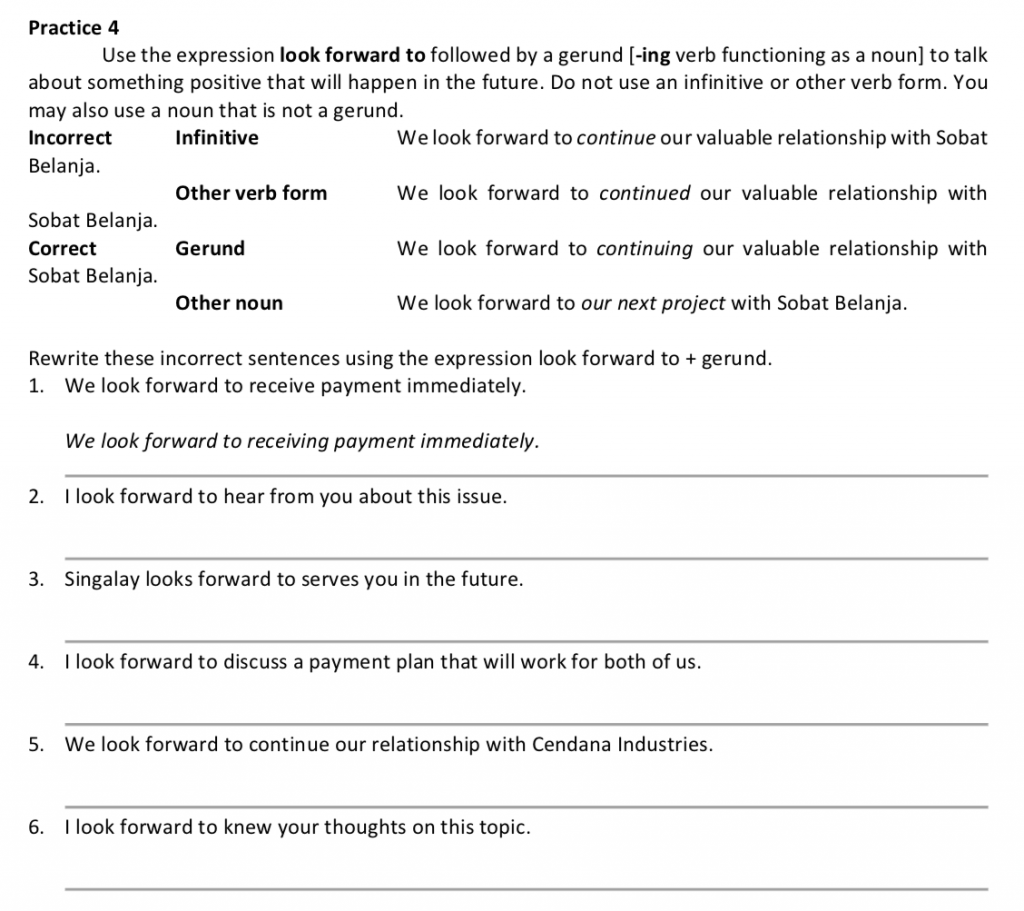
16. Replying to reminder/collection letter.
